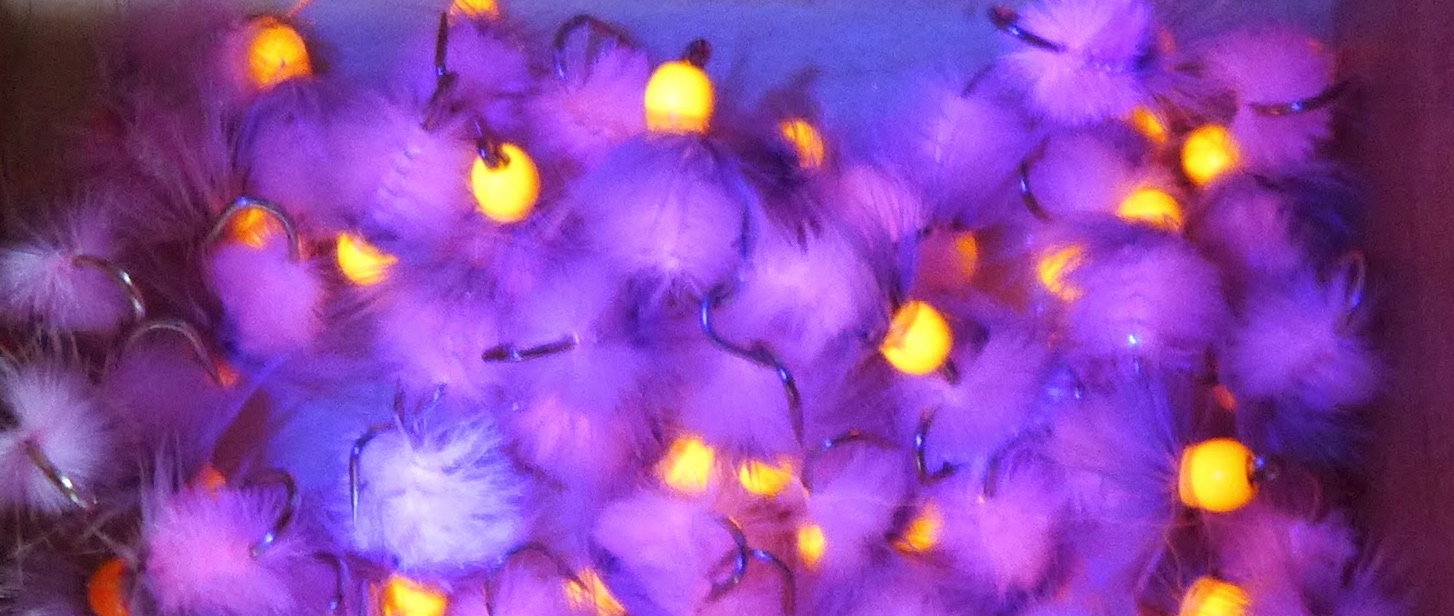[vc_row][vc_column][vc_column_text]As Mark recently pointed out, water temps are falling and we’re moving into winter. Scuds and sows are king and pink flies or flies with firebeads will continue to gain popularity as winter progresses. Popular winter flies include the Pink Lightning Bug, Amex, Rainbow Czech, Pink Ray Charles, Pink Scuds, Worms, Rainbow Warrior, Sows, Zebras, Ninch’s Pill Popper Scud and Bubbleyum Sow, Mason’s Peep Show, and Ju-ju Baetis.
Why do these particular patterns work so well during the winter? If you don’t care why they are working and only that they do, stop reading this now, get some of these patterns, and go catch some fish. If you are curious, read on.[/vc_column_text][/vc_column][/vc_row][vc_row][vc_column][vc_column_text]What do these flies have in common? Most of them incorporate fluorescent pink or orange materials. A lot of anglers might tell you that these flies work because they are being taken as eggs. This might be the case. However, independent of the egg hypothesis, the fluorescent materials in these flies make them very visible to the fish.
Fluorescent materials have some unique optical qualities. When light of any wavelength hits fluorescent materials, these materials continue to reflect light of their own color. This means that fluorescent orange firebeads will appear bright orange regardless of depth or water clarity. Additionally, fluorescent materials are able to absorb ultraviolet (UV) light and continue to reflect their original coloration. In other words, fluorescent materials look bright and are visible from a long ways off even in deep water.
Fish facing upstream will notice a fluorescent fly coming downstream sooner than any other colored object, and if the fish is able to quickly notice the fly, the chances of the fly getting eaten improve dramatically. If you check out the photos at the bottom of this post, you’ll see what I’m talking about. They show the fly under regular light compared with how it looks under UV light. The fluorescent hot spots really stand out.
Some of you might be ready to call bull at this point and claim, “I’ve caught millions of fish with non-fluorescent flies!!!” I’m not going to argue with you. I’m only suggesting that adding a fluorescent firebead or hotspot to a fly will make it easier for a fish to notice it. And isn’t that what we all want, to get our flies noticed?
Now, let’s take another look at some effective winter nymphs and try to interpret their effectiveness in the context of fluorescent materials. I examined the fluorescence of these flies by shining the shop’s UV light on them and noting what parts glowed. You can check out the fluorescent qualities of your own flies by shining a UV light into your fly box.
- Pink Lightning Bug – The pink antron tail is somewhat fluorescent.
- Amex – The pink dubbing in the abdomen is fluorescent.
- Rainbow Czech – The pink hotspot is fluorescent.
- Pink Ray Charles – The non-bead versions have a fluorescent orange thread head. The bead-head versions have a fluorescent orange firebead. Check out the photos of the firebead version that accompany this post.
- Ninch’s Pill Popper Sow – The pink firebead is fluorescent.
- Ninch’s Bubble Yum Scud – The thread is fluorescent orange and there is a fluorescent pink dubbing hotspot.
- Worms – Some patterns are tied with fluorescent thread. Other patterns incorporate a firebead.
- Rainbow Warrior – The underbody and thread collar are both tied with fluorescent orange thread.
- Sows – Many patterns incorporate fluorescent thread heads.
- Zebras – Often not fished with fluorescent materials, but why not?
- Mason’s Peep Show – The orange thread collar is very fluorescent. Check out the photos accompanying this post.
- Ju-ju Baetis – The Flouro-Fiber material that the wing case and legs is tied out of is fluorescent.
If you’ve already been fishing these flies, hopefully this post will help you understand why they work so well. If you haven’t been fishing these patterns, give a few of them a shot the next time you go out. Or maybe some of you have your own secret killer patterns with fluorescent materials in them? If you have a UV light on your fly tying bench, I’d recommend shining it into your fly boxes. The results are pretty interesting. We also have a UV light in the shop if you want to go to town on our bins. Or you can come in and find plenty of fluorescent threads and beads in the fly tying selection that Ninch has put together in the shop.[/vc_column_text][/vc_column][/vc_row][vc_row][vc_column width=”1/2″][vc_column_text]
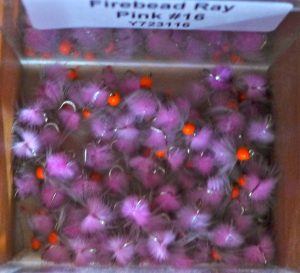
[/vc_column_text][/vc_column][vc_column width=”1/2″][vc_column_text]
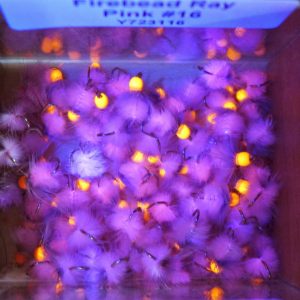
[/vc_column_text][/vc_column][/vc_row][vc_row][vc_column width=”1/2″][vc_column_text]
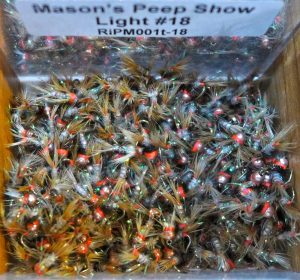
[/vc_column_text][/vc_column][vc_column width=”1/2″][vc_column_text]
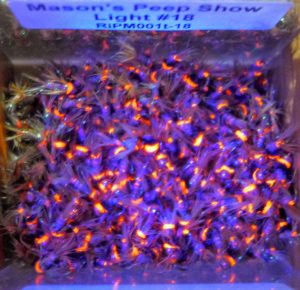
[/vc_column_text][/vc_column][/vc_row]
